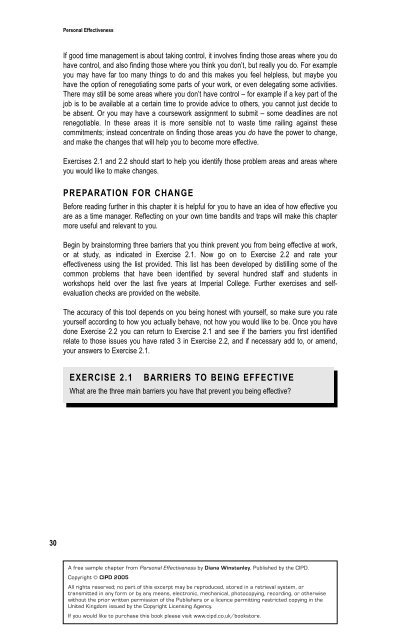Download - CIPD
Download - CIPD
Download - CIPD
Create successful ePaper yourself
Turn your PDF publications into a flip-book with our unique Google optimized e-Paper software.
Personal EffectivenessIf good time management is about taking control, it involves finding those areas where you dohave control, and also finding those where you think you don’t, but really you do. For exampleyou may have far too many things to do and this makes you feel helpless, but maybe youhave the option of renegotiating some parts of your work, or even delegating some activities.There may still be some areas where you don’t have control – for example if a key part of thejob is to be available at a certain time to provide advice to others, you cannot just decide tobe absent. Or you may have a coursework assignment to submit – some deadlines are notrenegotiable. In these areas it is more sensible not to waste time railing against thesecommitments; instead concentrate on finding those areas you do have the power to change,and make the changes that will help you to become more effective.Exercises 2.1 and 2.2 should start to help you identify those problem areas and areas whereyou would like to make changes.PREPARATION FOR CHANGEBefore reading further in this chapter it is helpful for you to have an idea of how effective youare as a time manager. Reflecting on your own time bandits and traps will make this chaptermore useful and relevant to you.Begin by brainstorming three barriers that you think prevent you from being effective at work,or at study, as indicated in Exercise 2.1. Now go on to Exercise 2.2 and rate youreffectiveness using the list provided. This list has been developed by distilling some of thecommon problems that have been identified by several hundred staff and students inworkshops held over the last five years at Imperial College. Further exercises and selfevaluationchecks are provided on the website.The accuracy of this tool depends on you being honest with yourself, so make sure you rateyourself according to how you actually behave, not how you would like to be. Once you havedone Exercise 2.2 you can return to Exercise 2.1 and see if the barriers you first identifiedrelate to those issues you have rated 3 in Exercise 2.2, and if necessary add to, or amend,your answers to Exercise 2.1.EXERCISE 2.1 BARRIERS TO BEING EFFECTIVEWhat are the three main barriers you have that prevent you being effective?30A free sample chapter from Personal Effectiveness by Diana Winstanley. Published by the <strong>CIPD</strong>.Copyright © <strong>CIPD</strong> 2005All rights reserved; no part of this excerpt may be reproduced, stored in a retrieval system, ortransmitted in any form or by any means, electronic, mechanical, photocopying, recording, or otherwisewithout the prior written permission of the Publishers or a licence permitting restricted copying in theUnited Kingdom issued by the Copyright Licensing Agency.If you would like to purchase this book please visit www.cipd.co.uk/bookstore.

















